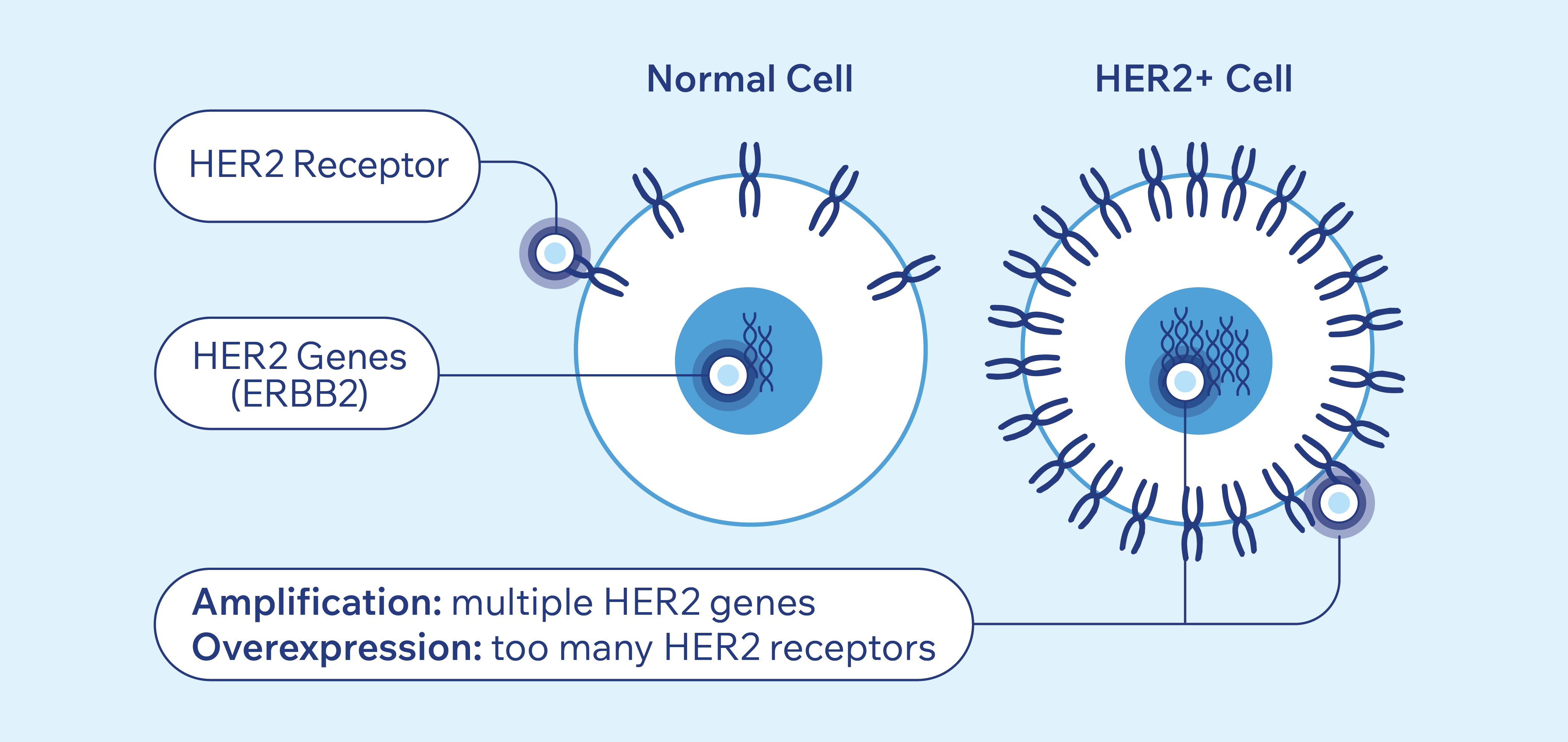
HER2 (also known as ERBB2 or Erb-B2 receptor tyrosine kinase 2) is a gene involved in the control of cell growth and cell survival. Some cells may have an increased number of copies of the HER2 gene. This is called gene amplification. HER2 gene amplification causes the cells to make too much HER2 protein (protein overexpression). However, there are other causes of HER2 protein overexpression. HER2 gene mutations and some other processes (called epigenetic processes) may also cause HER2 protein overexpression. Therefore it is possible to have a normal number of HER2 gene copies (no HER2 gene amplification) but still have too much HER2 protein (HER2 protein overexpression).
When HER2 amplification and/or HER2 overexpression occurs, it can cause cancer by changing the normal control of cell growth and survival. Genes, like HER2, that can cause normal cells to become tumor (tumour) cells are called oncogenes. The changes in HER2 that are related to colorectal cancer are not hereditary, meaning they are not passed from parents to children.

HER2 is important in several different solid tumors, including breast carcinoma and gastrointestinal cancers. HER2 amplification and/or overexpression occurs in 15-20% of breast cancers, 20% of stomach cancers (gastric cancers), and 3-5% of all colorectal cancers (CRC). The percentage is higher in colorectal cancer without KRAS, NRAS, or BRAF mutations, meaning colorectal tumors with KRAS wild-type (non-mutant), NRAS wild-type, and BRAF wild-type are more likely to have HER2 abnormalities.
HER2 is both a prognostic and a predictive biomarker. It gives information about the likely course of disease (prognosis) and predicts whether a tumor will respond to anti-EGFR and anti-HER2 therapies.
HER2 status is primarily tested in a tumor cell biopsy sample. HER2 testing is usually performed on a sample of primary tumor. HER2 status results from testing a sample of tumor metastasis can be different from primary tumor results in some cases.
HER2 status can be tested with several laboratory methods, including immunohistochemistry (IHC), fluorescence in situ hybridization (FISH), and next-generation sequencing (NGS).
IHC is a method of analyzing proteins in a tissue biopsy by adding an antibody probe created in the laboratory that will stick or attach to the protein (antigen) of interest, in this case HER2. The antibody probe is also bound to a chemical compound that makes it visible under a microscope. This can be used to measure the amount of HER2 protein by looking at the amount of the visible antibody probe bound to it.
For the FISH method, probe DNA including the HER2 gene is created in the laboratory and bound to fluorescent compounds. The fluorescent DNA probe is then added to a sample of tumor DNA. Matching segments of DNA will attach to each other and appear fluorescent. This allows the laboratory to see the similarities and differences in the probe DNA and the tumor DNA.
HER2 status may also be tested in a blood sample by examining circulating tumor DNA (ctDNA) for HER2 gene amplification. This is called a liquid biopsy. HER2 can be tested individually, or as part of a multiple gene panel using next-generation sequencing (NGS).
HER2 results are reported as “negative” or “positive”. Negative means the there is no HER2 gene amplification or HER2 protein overexpression. Positive means that HER2 gene amplification and/or HER2 protein overexpression is present. HER2 positive results may also include a number, such as +1, +2, +3, or +4 to indicate the amount of HER2 expression. A higher number indicates a larger amount of HER2 protein expression in the tumor sample.
If your colon cancer or rectal cancer is “HER2 negative”, meaning your cancer has a normal amount of HER2 gene copies or HER2 protein
If your colorectal cancer (bowel cancer) is “HER2 positive”, meaning your cancer has HER2 gene amplification or HER2 overexpression
There are ongoing clinical trials for treatments that are more effective against colorectal cancers with HER2 amplification. Talk to your oncology team about whether you could benefit from a clinical trial.
If you have stage IV / metastatic colorectal cancer you should be tested for HER2.
A biomarker is a piece of information about your health. Biomarkers include your blood pressure, your blood type, and cholesterol or blood sugar levels measured in a blood test. The biomarkers of cancer are also known as tumor markers.